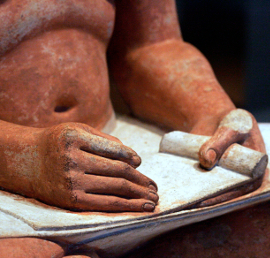Ancient letter shows little has changed
 A postgrad student has deciphered a letter dating back 1,800 years, written by an Egyptian soldier serving in a Roman legion in Europe.
A postgrad student has deciphered a letter dating back 1,800 years, written by an Egyptian soldier serving in a Roman legion in Europe.
The letter bears a striking resemblance to those that soldiers write back to their families today, showing the fear and desperation of war throughout history.
It also shows that families have been bickering, it seems, since the beginning of time.
The private letter was sent home by Roman military recruit Aurelius Polion. It was uncovered in 1899 by an expedition team in the ancient Egyptian city of Tebtunis, catalogued and filed away.
Religious Studies graduate student Grant Adamson took up the task of deciphering the correspondence in 2011, spending several years piecing together the fractured letter, which was written primarily in Greek.
“Because it was in such bad shape, no one had worked much on it for about 100 years,” Adamson says.
Even now, portions of the letter’s contents are uncertain, missing or impossible to reconstruct.
Polion’s letter to his family tells of a man who desperate to reach home, feeling dejected after sending six letters that went unanswered.
“I pray that you are in good health night and day, and I always make obeisance before all the gods on your behalf,” Polion wrote.
“I do not cease writing to you, but you do not have me in mind. But I do my part writing to you always and do not cease bearing you [in mind] and having you in my heart.
“But you never wrote to me concerning your health, how you are doing. I am worried about you because although you received letters from me often, you never wrote back to me so that I may know how you are.
“I sent six letters to you. The moment you have me in mind, I shall obtain leave from the consular [commander], and I shall come to you so that you may know that I am your brother.
“For I demanded nothing from you for the army, but I fault you because although I write to you, none of you … has consideration... I am your brother.”
Adamson believes that Polion was stationed in the Roman province of Pannonia Inferior at Aquincum, in modern day Budapest.
He said that the legion to which Polion belonged is known to have been mobile, and may have travelled as far as Byzantium.
“Polion was literate, and literacy was rarer then that it is now, but his handwriting, spelling and Greek grammar are erratic,” Adamson said, which made English translation of the damaged letter even more difficult.
“He likely would have been multilingual, communicating in Egyptian or Greek at home in Egypt before he enlisted in the army and then communicating in Latin with the army in Pannonia.”
As for actually aging the document, there are a number of clues within it that help pinpoint the date.
A key hint is the soldier’s Roman name, Aurelius. Researchers say he most likely acquired it as part of a widespread granting of Roman citizenship in the year 212. And another hint is Polion’s reference to a “consular commander,” which suggests a date after 214, when the Roman province of Pannonia Inferior came under consular governance.
Polion’s complete letter as it survives and Adamson’s full paper are available in PDF form, here.








 Print
Print